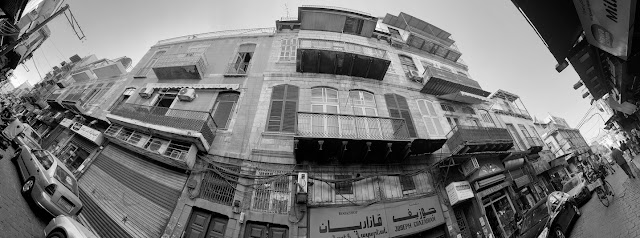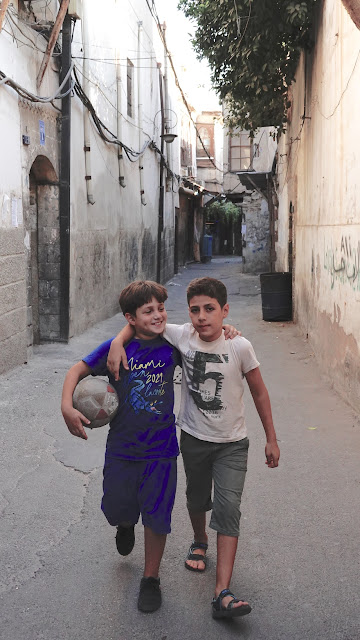Welcome to my 108th UN Country being Syria !!!
In this post I travel from Beirut in Lebanon to Damascus, the Capital and Largest city of Syria. This post also covers our visit of Damascus.
At 9am I met my nine fellow travellers at the Caramel Boutique Hotel, only 400m from my own hotel in Beirut. There were two other ozzies, two from Denmark, three from Germany and one each from Scotland and Ireland. Our tour leader Lana is also originally from England but has been living abroad for the last 10 years with the last 4 in Berlin.
The 113km drive from Beirut to Damascus was short, high, dry and hot. Short because the actual drive itself only took 90min, High because we reached 1500m near the border, Dry because there is not a tree in sight and finally Hot because it was 35C outside. The border crossing was without incident but it took 45min due to paperwork. We had to show COVID Vaccination Certificates and the visa cost a cool 67USD. The border was not super busy just bureaucratic.. Finally we were in Syria. Damascus was only another 35min from the border surrounded by yellow and light tan stony desert with small scrubs and the occasional tree. There were some canyons just before the city.
We wasted no time on arrival to Damascus. We checked in to a very ornate and old hotel (built in the 1800s) right in the centre of the old town and then were off to see the sites. Our local guide Rami was born and raised in Damascus and full of facts and a great storyteller. He is actually a professional translator adding Arabic subtitles to American and other foreign films and even doing voice-overs for radio.
On the day of arrival at 3pm, we walked several kilometres visiting: two old stone gates, churches and mosques and many streets with old Arab & Ottoman architectural influenced houses. That evening we enjoyed a sumptuous food in a traditional Syrian restaurant washed down by plenty of local beer. The food is almost exactly the same as Lebanese being of the Levant Peoples but Syria has their own version of Hummus and Tahini and even one based on pulverised pomegranate which we all voted the best tasting – it is caramel coloured and called Mohammar. Pomegranate sauce is dark brown and always on the table like American Ketchup – Syrians put it on everything.
The next day I went for my 102th UN Country run from my hotel out towards the airport. The airport road was very busy but wide enough to easily avoid cars and bikes. On this day we visited the following places all over Damascus: The National Museum of Syria (which contained many Ancient Greek influence artefacts), Handicraft Market, Umayyad Mosque, St Ananias Church (where St. Paul was baptised), View of Damascus near Presidential Palace, The Damascene Sword Monument, the Talisman Hotel,
Al-pasha Hamidiyah Souq & the Khan Asaad Pasha Al Azem Caravan (old building used by camel traders). The highlight was the huge Umayyad Mosque. This mosque has a green shrine inside (looks like a little church) and it is claimed to store the Head of St John The Baptist since the mosque is on the site of a very old Byzantine Church dedicated to St John so the local Muslims decided to honour this scared site with this shrine. This is the first significant thing I learnt about Damascus and Syria – that ordinary Muslims and Christians happily co-exist – the city and even country towns have mosques next to churches, something I have only seen in Sierra Leone – more proof that ordinary Muslims and Christians can happily co-exist and even Rami confirmed that it is the radicals and politicians that cause division and trouble. We were also fortunate to visit the studio and gallery of Mustafa Ali, a very famous and well-known artist all over the world – you will see a photo of him – he looks like one of the old ozzie Leyland Brothers !!! That evening we all gathered on a magical rooftop bar overlooking all of Damascus and watched the sun set. Downstairs we then enjoyed a convert of western songs sung by a Syrian Group of four women and one man.
I must say that Damascus was as I expected. Old and badly run down but with an ancient, almost exotic feel to it. It reminded me a lot of the Moroccan cites I visited but it has magnetism of its own. Yes it was affected by the conflict (called CRISIS by the locals and not WAR and not CIVIL WAR) but it is also obvious that efforts are being made to restore damaged areas and keep the ancient artefacts intact. It speaks of antiquity and multiple civilisations because it is at the crossroads of civilisation the border between east and west,
Enjoy the visions of Damascus – I am glad I came…
ABOUT SYRIA:
Syria (Pop 17,500,658, Highest Peak 2814m, Founded 1920), officially the Syrian Arab Republic is a Western Asian country located in the Eastern Mediterranean and the Levant. A country of fertile plains, high mountains, and deserts, Syria is home to diverse ethnic and religious groups, including the majority Syrian Arabs, Kurds, Turkmens, Assyrians, Armenians, Circassians, Albanians, and Greeks. Religious groups include Muslims, Christians, Alawites, Druze, and Yazidis. Arabs are the largest ethnic group, and Muslims are the largest religious group.
The modern Syrian state was established in the mid-20th century after centuries of Ottoman rule. After a period as a French mandate (1923–1946), the newly created state represented the largest Arab state to emerge from the formerly Ottoman-ruled Syrian provinces. It gained independence as a parliamentary republic on 24 October 1945 when the Republic of Syria became a founding member of the United Nations, an act which legally ended the former French Mandate.
The post-independence period was tumultuous, with many military coups and coup attempts shaking the country from 1949 to 1971. In 1958, Syria entered a brief union with Egypt called the United Arab Republic, which was terminated by the 1961 Syrian coup d'état. The republic was renamed as the Arab Republic of Syria in late 1961 after the December 1 constitutional referendum of that year, and was increasingly unstable until the 1963 Ba'athist coup d'état, since which the Ba'ath Party has maintained its power. Syria was under Emergency Law from 1963 to 2011, effectively suspending most constitutional protections for citizens.
Bashar al-Assad has been president since 2000 and was preceded by his father Hafez al-Assad, who was in office from 1971 to 2000. Throughout his rule, Syria and the ruling Ba'ath Party have been condemned and criticized for various human rights abuses, including frequent executions of citizens and political prisoners, and massive censorship. Since March 2011, Syria has been embroiled in a multi-sided civil war, with a number of countries in the region and beyond involved militarily or otherwise. As a result, a number of self-proclaimed political entities have emerged on Syrian territory, including the Syrian opposition, Rojava, Tahrir al-Sham and the Islamic State group. Syria was ranked last on the Global Peace Index from 2016 to 2018, making it the most violent country in the world due to the war. The conflict has killed more than 570,000 people, caused 7.6 million internally displaced people) and over 5 million refugees, most in Lebanon with a population of 6,825,445.
Despite this sad story, Syria has traces of Neolithic occupation dating back to 10,000BC and home to the earliest recorded indigenous civilization in the region being the Kingdom of Ebla near present-day Idlib, northern Syria. Ebla appears to have been founded around 3500 BC and gradually built its fortune through trade with the Mesopotamian states of Sumer, Assyria, and Akkad. Gifts from Pharaohs, found during excavations, confirm Ebla's contact with Egypt. Syria was later conquered by the Greek Macedonian Empire, which was ruled by Alexander the Great c. 330 BC. The Apostle Paul, was converted on the Road to Damascus and emerged as a significant figure in the Christian Church at Antioch in ancient Syria, from which he left on many of his missionary journeys.
The Syrian Economy has been seriously damaged by
the Civil War but slowly coming back due to new oil findings in the Mediterranean
which now account for 40% of GDP. Another 20% comes from Agriculture.
Unemployment is high and many consider the country has third world.
ABOUT DAMASCUS:
Damascus (Pop 2,503,000, Elevation 680m, Settled
3,000BC) is the Capital and Largest City of Damascus. Damascus is officially
the oldest continuously inhabited capital city in the world, first settled in
the 3rd millennium BC. The city has a rich history given it was occupied by
many ancient civilisations. It is surrounded by desert with a hot dry climate
and limited rainfall. Large parts of the city were destroyed during the Civil
War and it has been voted as the LEAST LIVABLE CITY out of 140 cities since
2011. St Paul and St Thomas lived here for a while and two Roman Catholic Popes
were born in this city.













































No comments:
Post a Comment